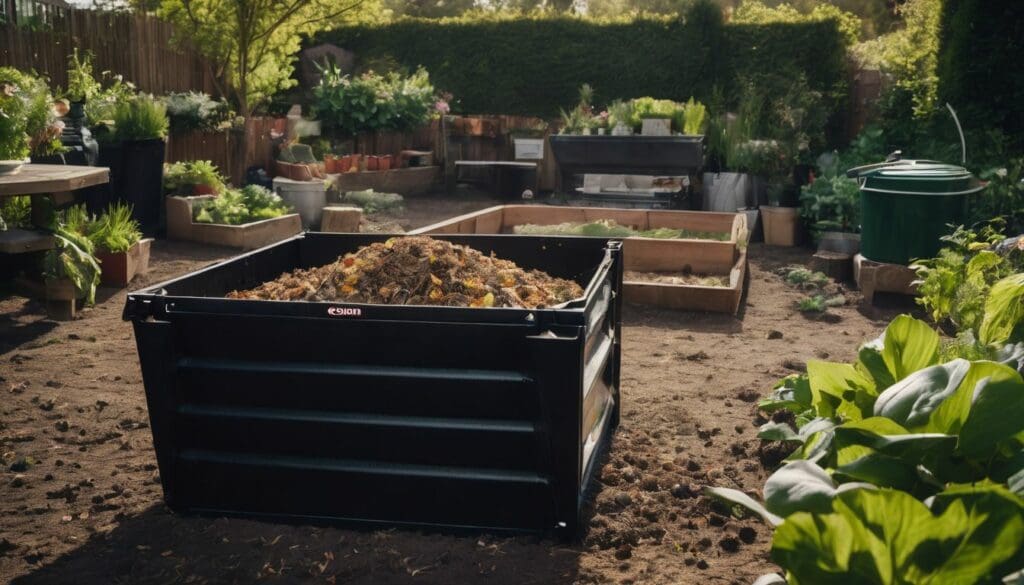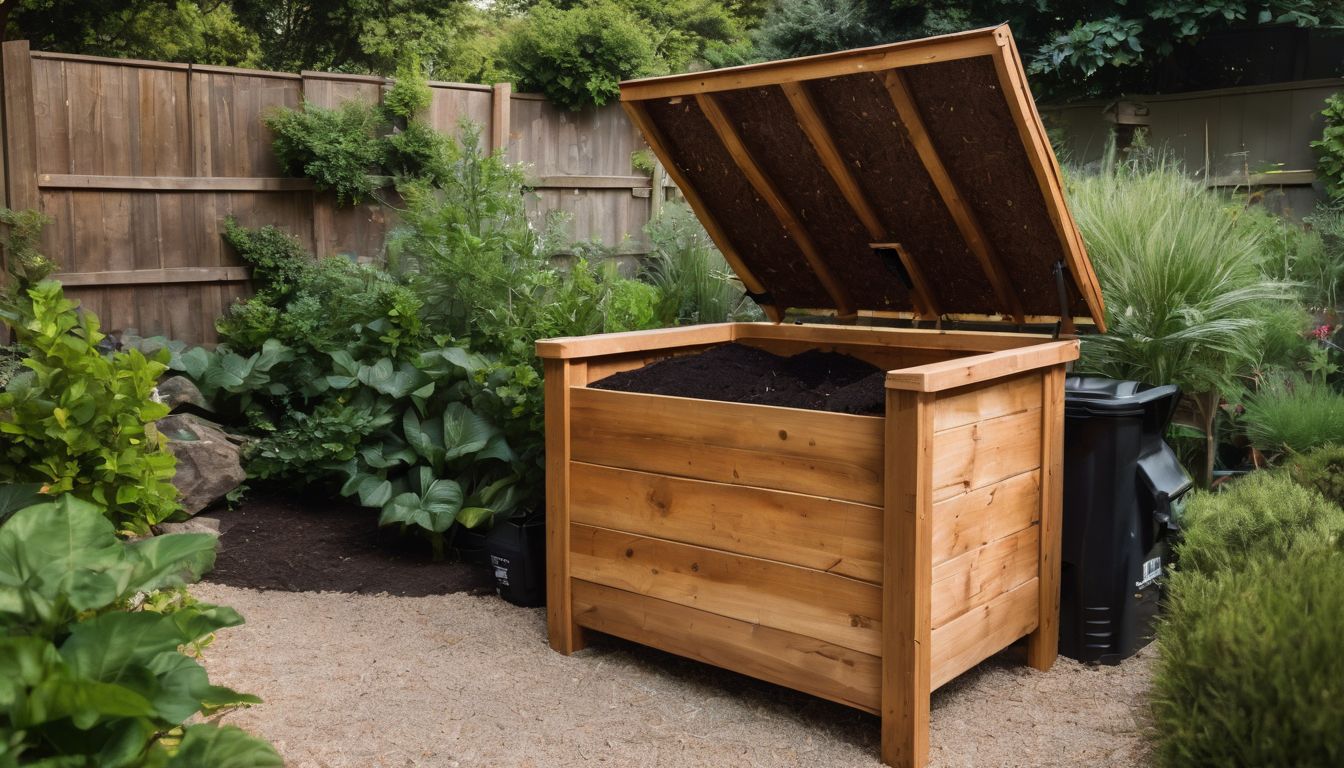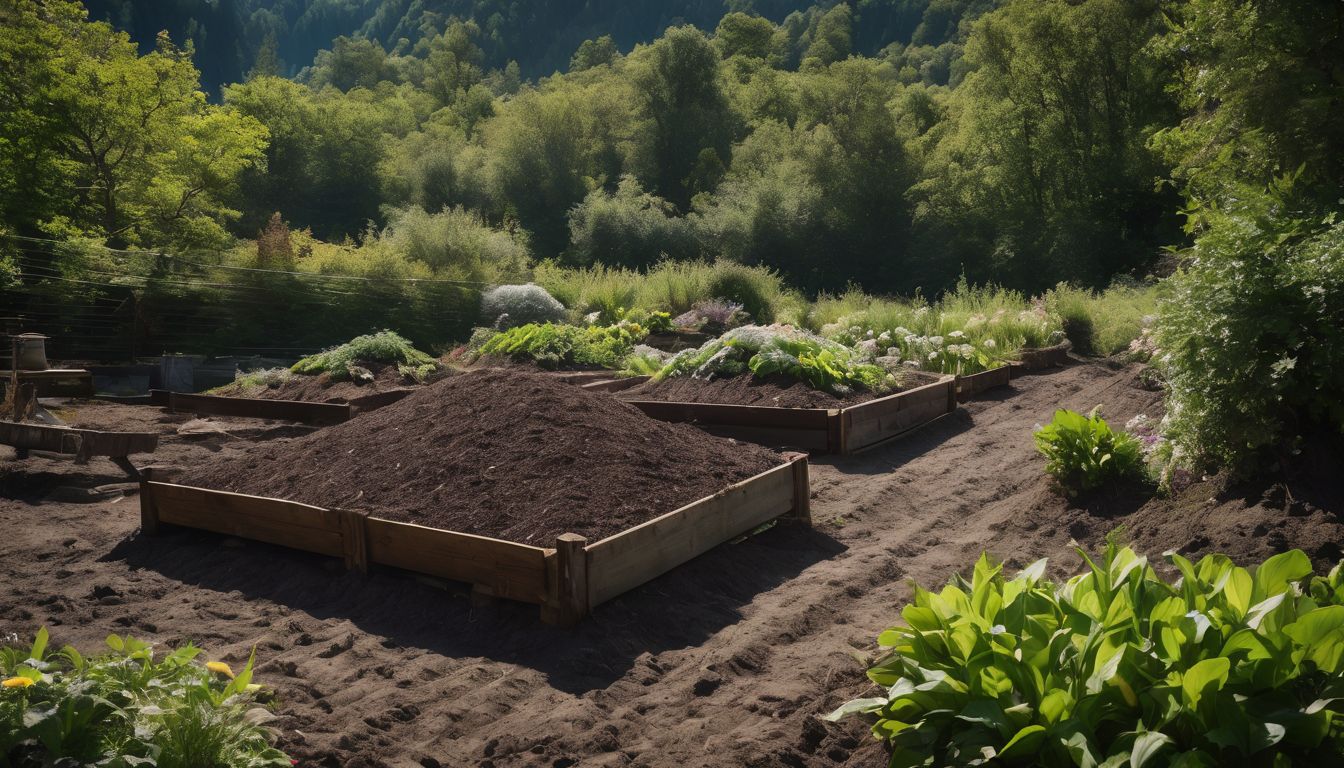Every week, our kitchen bins fill up with peelings and leftovers, contributing to a growing waste problem. In the UK alone, we send millions of tonnes of organic waste to landfills each year.
This article reveals how turning this ‘waste’ into compost at home can help cut down landfill use and nourish our gardens. Discover the world beneath your scraps.
Key Takeaways
- Composting transforms kitchen and garden waste into valuable, nutrient – rich soil, helping to drastically cut landfill use and the associated methane emissions that contribute to climate change.
- There are various methods of composting available such as vermicomposting, aerated static pile composting, and Bokashi fermentation; each can be tailored to individual needs and space availability.
- By promoting healthier plant growth without chemical fertilisers, compost acts as a natural pesticide and enhances the quality of soil. This contributes to environmental health by fostering rich ecosystems capable of resisting pests naturally.
- Implementing local policies on organic waste management supports community-wide composting efforts. Residents can actively participate in these sustainable practices by staying informed about regulations and available resources for home composting.
- Compostable packaging is emerging as an environmentally friendly solution to conventional plastics, reducing long-term waste while also being suitable for producing high-quality compost when disposed of properly.
Understanding Composting
Composting is the process of breaking down organic materials like food scraps and yard waste into nutrient-rich soil. There are various approaches to composting, from traditional backyard methods to industrial-scale operations.
Understanding the basics of composting is essential for sustainable living.
What is composting?
Composting is a natural process that turns food scraps and garden waste into nutrient-rich soil. All you need to get started are organic materials like vegetable peelings, paper products, and fallen leaves.
Microorganisms break these down over time, producing compost that can dramatically improve the health of your garden’s earth. This material acts as a sustainable alternative to chemical fertilisers and helps in carbon capture by storing it in the soil.
Incorporating this eco-friendly practice into daily life tackles several environmental issues simultaneously. It reduces methane emissions from landfills since organic matter doesn’t end up decomposing anaerobically there.
Moreover, by recycling kitchen and yard debris into compost, we cut down on greenhouse gas production while managing waste more effectively within our own homes or communities. Soil conditioned with homemade compost also supports erosion control by enhancing its structure and water retention abilities, making gardens more resilient against extreme weather patterns.
The different approaches
After understanding what composting is, let’s delve into the different approaches to composting that can be incorporated into sustainable living practices.
- Vermicomposting involves using worms to break down organic materials, such as kitchen scraps and garden waste, into nutrient-rich compost.
- Aerated static pile composting uses large piles of organic material mixed with bulking agents and turned regularly to maintain airflow and promote decomposition.
- Bokashi composting utilises a special mix of microorganisms to ferment kitchen waste, including meat and dairy products, in an anaerobic environment.
- In – vessel composting takes place in a container or vessel that controls factors like temperature, moisture, and aeration to speed up the decomposition process.
- Cold composting involves simply collecting organic materials in a pile or bin and allowing them to decompose over time without turning or special maintenance.
Environmental Impacts
Sending organic waste to landfill contributes to the EPA’s Wasted Food Scale, while also producing negative effects on the environment.
EPA’s Wasted Food Scale
The EPA’s Wasted Food Scale offers insight into the gravity of food waste and its environmental impact. Below is a concise representation of the scale in a tabular format:
| Food Waste Category | Description | Environmental Impact |
|---|---|---|
| Prevention | Minimise surplus food generation. | Most effective in reducing environmental harm. |
| Feed Hungry People | Donate extra food to charities and food banks. | Alleviates hunger and conserves resources. |
| Feed Animals | Divert food scraps to animal feed. | Reduces reliance on traditional animal feed production. |
| Industrial Uses | Convert waste into energy or other industrial products. | Creates renewable energy; lessens fossil fuel dependence. |
| Composting | Decompose organic waste for nutrient-rich soil amendment. | Improves soil health; cuts methane emissions from landfills. |
| Landfill/Incineration | Last resort disposal in landfills or incineration facilities. | Generates greenhouse gases; harmful environmental consequences. |
This scale prioritises food waste reduction strategies to mitigate environmental damage.
Negative effects of sending organic waste to landfill
Sending organic waste to landfill has negative effects on the environment. When organic waste decomposes in a landfill, it produces methane gas which is a potent greenhouse gas, contributing to climate change.
By diverting organic waste from landfills and instead composting it, we can significantly reduce these harmful emissions. Additionally, when organic matter breaks down in anaerobic conditions within a landfill, it generates leachate – a toxic liquid that can contaminate soil and water sources.
Moreover, landfill disposal of organic waste leads to missed opportunities for producing valuable compost. Nutrient-rich soil created from compost promotes healthier plant growth and reduces the need for chemical fertilisers.
Benefits of Composting
Composting has numerous benefits, including reducing waste, improving soil health, and providing natural pest control and fertiliser. These benefits not only contribute to sustainable living but also promote a healthier environment for current and future generations.
Reducing waste
Reducing waste through composting is a practical way to lessen the environmental burden of organic materials being sent to landfills. By composting food scraps and yard waste, we can significantly reduce the amount of methane gas produced in landfills, thus minimising greenhouse gas emissions.
Additionally, incorporating compostable materials into our daily lives allows us to contribute to sustainable living by diverting these items from landfills and utilising them for their valuable nutrient-rich qualities.
Turning organic waste into nutrient-rich soil not only reduces the strain on landfill capacity but also contributes to improved soil health and natural pest control. Composting has become an important tool in waste management, offering environmentally conscious individuals a simple yet impactful way to participate in green living practices.
Improving soil health
Improving soil health is a crucial benefit of composting. It enriches the soil with essential nutrients, promoting healthier plant growth and stronger root systems. Nutrient-rich soil also supports diverse ecosystems, aiding in natural pest control and creating sustainable landscapes that are environmentally friendly.
Composting contributes to the vitality of renewable resources by fostering nutrient cycling and reducing dependence on chemical fertilisers. The resulting eco-friendly practices promote sustainability and support climate resilience through the creation of healthy, fertile soils that can adapt to environmental changes.
Natural pest control and fertiliser
Improving soil health creates an environment that naturally deters pests and promotes healthy plant growth. Compost, rich in nutrients, helps to create a strong ecosystem where plants can thrive without the need for harmful chemical fertilisers or pesticides.
By enriching the soil with compost, it provides a natural form of pest control and acts as a powerful organic fertiliser, promoting sustainable gardening practices that support environmental balance.
Composting not only nourishes the soil but also contributes to creating a natural defence against pests while providing essential nutrients for plants to grow strong and healthy. By harnessing the power of compost as a natural pest control measure and fertiliser, individuals can actively contribute to eco-friendly gardening practices that support nutrient-rich soil and environmental benefits.
Composting for Climate Resilience
Composting plays a vital role in reducing greenhouse gas emissions and promoting climate resilience. It also contributes to hazardous waste remediation, making it an essential practice for sustainable living.
Reducing greenhouse gas emissions
Reducing greenhouse gas emissions is a crucial benefit of composting. When organic waste decomposes in landfills, it produces methane, a potent greenhouse gas that contributes to climate change.
By diverting organic waste from landfills and instead using it for composting, we can significantly reduce these harmful emissions.
Composting decreases the amount of organic matter that ends up in landfills and releases less methane into the atmosphere. This eco-friendly practice not only enriches soil but also plays a vital role in mitigating climate change by reducing greenhouse gas emissions, making it an essential aspect of sustainable living for environmentally conscious individuals.
Hazardous waste remediation
Composting is a valuable tool for hazardous waste remediation, as it can help break down and neutralise harmful substances found in organic materials. By composting items such as food scraps and garden waste instead of sending them to landfill, we can prevent toxins from leaching into the soil and water sources.
This eco-friendly practice not only reduces the environmental impact of hazardous waste but also contributes to creating nutrient-rich soil that supports healthy plant growth.
When we incorporate composting into our sustainable living efforts, we actively participate in the remediation of hazardous waste while promoting a healthier environment for our communities.
Importance of compostable packaging
– Hazardous waste remediation is vital, and so is the importance of compostable packaging. Compostable packaging plays a crucial role in reducing environmental impact, as it breaks down naturally into nutrient-rich soil.
This eco-friendly alternative to traditional plastics helps decrease waste while providing essential nutrients for plants. By choosing compostable packaging, environmentally conscious individuals actively support conservation efforts and contribute to sustainable living.
– Incorporating compostable packaging into daily life can significantly reduce the negative effects of conventional plastic waste on the environment.
Incorporating Composting into Sustainable Living
Utilise compost in your garden, support local policies and regulations on composting, and explore resources for composting at home. Join the sustainable living movement today!
How compost can be used
- Enriching soil: Compost provides essential nutrients and improves soil structure, promoting healthy plant growth.
- Mulching: Applying compost as a protective layer around plants helps retain moisture, suppress weeds, and regulate soil temperature.
- Organic fertiliser: Compost serves as a natural, eco-friendly alternative to chemical fertilisers, nourishing plants without harmful synthetic additives.
- Erosion control: By stabilising slopes and preventing soil runoff, compost helps in erosion control, particularly in areas prone to erosion.
- Landscaping: Incorporating compost into landscaping projects enhances the overall health and vitality of gardens, lawns, and ornamental plants.
- Remediation of contaminated soil: Compost can aid in restoring polluted or degraded soils by breaking down contaminants and improving soil quality.
- Carbon sequestration: Utilising compost allows for carbon sequestration in the soil, contributing to climate change mitigation efforts.
Policies and regulations
Local governments often have policies and regulations in place to support composting initiatives. These may include guidelines for managing organic waste, incentives for businesses and residents to compost, or requirements for commercial establishments to divert food waste from landfills.
By understanding and complying with these regulations, individuals can play a crucial role in advancing sustainable living practices within their communities.
Familiarising oneself with local composting policies empowers environmentally conscious individuals to take proactive steps towards reducing food waste and contributing positively to the environment.
Resources for composting at home
To effectively compost at home, you can utilise the following resources to support your environmentally conscious lifestyle and contribute to sustainable living:
- Compost Bins: Purchase or make your own compost bin that suits the size of your household and space available. Ensure it has a lid to keep pests out.
- Compostable Materials List: Familiarise yourself with what can and cannot be composted including fruit and vegetable scraps, coffee grounds, eggshells, yard waste, and paper products.
- Composting Guides: Seek out guides or online resources for detailed instructions on how to start, maintain, troubleshoot common issues in composting, and use finished compost.
- Community Workshops: Look for local workshops or events hosted by environmental organisations or local government that provide hands-on training on home composting.
- Kitchen Compost Caddy: Invest in a small caddy for collecting daily kitchen scraps before transferring them to the main outdoor composter. This makes composting more convenient.
Conclusion
In conclusion, composting plays a crucial role in sustainable living by reducing waste and enriching soil. It contributes to climate resilience by minimising greenhouse gas emissions and remediating hazardous waste.
Embracing compostable packaging and incorporating composting into daily practices can significantly contribute towards a more eco-friendly lifestyle.
FAQs
1. What is composting and how does it support sustainable living?
Composting turns organic waste into nutrient-rich soil which helps in growing plants, reducing waste, and supporting an eco-friendly lifestyle.
2. Why is compost considered good for the environment?
By converting kitchen scraps and garden waste into compost instead of sending them to landfill, you create less rubbish and help lower greenhouse gas emissions.
3. Can I make my own compost at home?
Yes! You can easily start a home compost bin or heap to transform your food leftovers and garden clippings into valuable, eco-friendly soil enricher.
4. How does using compost help the planet?
Using the nutrient-rich soil from your home-made compost nourishes plants without chemical fertilisers, promotes healthier plant growth, and conserves natural resources contributing to a more sustainable world.





